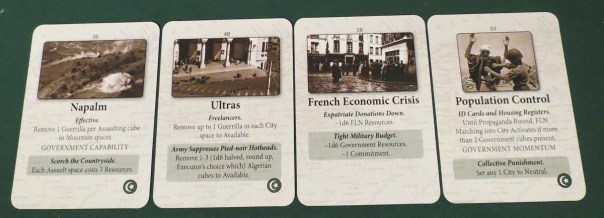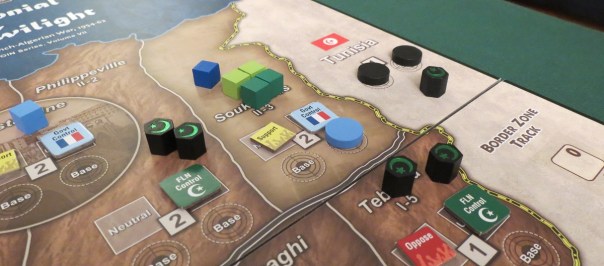COIN Volume VII: Colonial Twilight
Whether it’s tackling the Vietnam War, the Cuban Revolution, narco-terrorism in Colombia, or the shenanigans Julius Caesar pulled before attracting Shakespeare’s fancy, the COIN Series has never shied away from a hard topic. If anything, the French-Algerian War of 1954 to 1962 is a perfect fit for the series’ asymmetric take on insurgency warfare, casting players as either the French colonial government or the Front de Libération Nationale. Even better that it should be Brian Train’s second contribution after the quagmire simulator that was A Distant Plain.
But the stickiness of its setting isn’t why COIN’s seventh volume comes as such a surprise. Rather, it’s because Colonial Twilight is the first entry to feature fewer than four sides — and for all its familiarity, the result is a game that breaks exciting new ground for the series.
As Colonial Twilight’s play notes helpfully point out, David Galula was a French military officer who witnessed multiple lifetimes’ worth of insurgencies and counterinsurgencies, including the Algerian War. To say he wrote the book on the topic would only be inaccurate because he wrote two of them. In the process, he outlined four broad “laws” for conducting a counterinsurgency. You can find them easily enough elsewhere, but the gist comes down to the need to capture the attention of the populace — usually by appealing to a minority group in order to galvanize the neutral majority against another enemy minority — and to then maintain their loyalty through infrastructure, security, and long-term relationship-building.
As a theory, Galula’s laws emphasized control of the populace over control of territory, and that’s Colonial Twilight in a nutshell — with the caveat that even the best-laid plans never survive contact with the enemy.
The dynamic is simple enough. The French government is deeply invested in Algeria, having made it an official part of France over a hundred years earlier. They have large quantities of manpower, highly mobile special forces, and the resources to field both. The FLN, on the other hand, flourishes under cover of darkness, slinking across border checkpoints and establishing bases in mountain strongholds. Their soldiery isn’t as impressive or half as mobile as the Government’s, but they spend much of their time hidden from view, and must be effectively rooted out twice, once to reveal their location and again to actually wipe them out before they can disappear back into the hills. It’s an army of Goliaths versus a horde of Davids, and their rivalry is appropriately bitter.
Much of this bitterness is reflected by Colonial Twilight’s status as a two-player game. Gone is the back-and-forth quibbling that has long been a hallmark of the series, and the absence of a “middleman” faction is keenly felt. There’s no AUC here, no Syndicate, no Warlords or Aedui Confederation to reign in a runaway leader. There are only two bodies locked into this particular phone booth, applying nonstop pressure to one another’s throats.
The potentially negative side-effects of this downsizing are immediate and obvious. For one, there’s less conversation and certainly no deal-making. Where it was once possible to trade resources for favors — or unlaundered cash, or drug shipments — especially in relation to the game’s event cards, Colonial Twilight presents itself in a much more straightforward manner. The Government wants the population; so too does the FLN. The Government wants to eradicate FLN bases; the FLN would prefer that not happen. The FLN wants to border-hop their troops into Algeria from Tunisia and Morocco; “Haha, no,” goes the Government reply. With nearly every aspect of the game in direct contention, it’s safe to say that dialogue is not high on anybody’s list of priorities.
Strangely, however, this is one place where Colonial Twilight gets to shine. One of the primary complaints about the COIN System has always been the plodding pace of progressing toward victory. As a government player, you might sweep into a territory to reveal a whole bedazzle of guerrillas, only for their owner to slip them back underground the very next turn. Or as an insurgent, you might creep a terrorist bomber into an unprotected soft spot, only for the police to pinpoint their position two minutes later. While taking multiple actions in a row wasn’t outside the realm of possibility, it was usually a result of other players passing or the whims of the event deck rather than anything you intended. At its best, a good move in COIN was like a good move in chess, where the advantages of countering any given maneuver were constantly weighed against the strength of doing something else entirely.
By contrast, Colonial Twilight’s two-man initiative system not only allows a surprising amount of flexibility, but is also far easier to parse. Every round permits both sides to act, with the second player’s options limited to the adjacent spaces of the first guy’s pick. You can see it in action up above, offering the option to take some combination of ops and special activities (actions and bonus actions, for the uninitiated), leverage that round’s event, or do some administrative paperwork for extra resources. All the while, however, you need to consider the openings you’re leaving for your opponent — and perhaps more worryingly, what the turn order will look like next round. Instead of passing from one side to the other, it’s possible to retain the initiative for a good long time, provided you’re willing to avoid the more-powerful shaded spaces on the initiative track. This is something worth keeping in mind, especially because a swap means you’re handing the current second player two moves in a row.
Just because it’s easier to manipulate the play order doesn’t mean the path to victory is clearly paved, and fans of the way the COIN Series eludes easy decisions will find plenty to like here.
For one thing, the simplest operational order is prone to disruption at nearly every stage. The Government hopes to use its Sweep and Garrison actions to reveal insurgents, remove them with well-timed Assaults, then use Train to swing local opinion in their favor. Likewise, the FLN hopes to infiltrate susceptible region with bases, chip away at Government support with Terror and Ambushes, then eventually engage in some political agitation. Both of these processes are limited by any number of factors — resources, time, enemy actions, or even just the need to pursue your goals elsewhere.
This is familiar stuff for COIN veterans. But where Brian Train shows himself at his most devious is in the way nearly every action is subject to Newton’s Third Law of Motion. By way of example, one of the Government’s most powerful tools is their ability to resettle the local population. With enough of a military presence in a region, they can simply remove the locals entirely, effectively erasing that region from the game. While the FLN can still set up bases there, the population is now so minimal that there are no hearts and minds worth fighting over.
It’s a powerful move, but also a loaded one. For one thing, those population points are gone for both sides, making this an act of mutual withholding. Perhaps worse, the cost of all those refugees suddenly needing housing and jobs in France costs incremental resources that could have otherwise gone toward the war effort. Once resettled, always resettled — and always paying for it.
The feeling that every option presents blowback permeates many of both sides’ best actions. The easiest way for the Government to remove insurgents is to indiscriminately abuse the Neutralize action — but they’ll harden local opposition in the process. The FLN can undertake terrorist acts to diminish the will of the people to fight for the French, but mutilation, kidnapping, and intimidation can only get them so far, especially since their goal is eventual legitimacy. Sometimes the best gift is when your opponent takes things too far and tips public opinion in your favor.
Nicely, Colonial Twilight also acknowledges that its conflict spans beyond the borders of Algeria itself. Morocco and Tunisia transition from non-entities to considerable geographical realities once their independence is granted, making border security a constant and even overwhelming consideration. Meanwhile, both sides must walk the tightrope of managing France’s level of commitment toward victory, whether by keeping soldiers home — or sending them home in boxes — or by spending a few extra resources to have Algerian refugees massage public opinion back in Paris. In practice this is as easy as keeping tabs on your casualties and occasionally spending some resources to keep France’s commitment track in balance, but it does highlight that this is an international spectacle, with much of the world watching as a European colonial power decides how to treat its citizenry.
At its best, Colonial Twilight captures the high-level decision space of guerrillas and counterinsurgents alike, peeling back the layers to reveal the processes by which a war of independence is fought on both sides, and aptly illustrating the complexity that can arise when that war’s belligerents define “victory” by very different standards. Its take on war is brutal, bitter, and liable to leave both sides taking and retaking the same inches of ground many times over.
More immediately, it also represents an important step forward for the COIN Series as a whole. Two more volumes are slated for release in the near future, but both fit firmly into the usual four-sided format. Even though it sheds some of its political cajoling — which I personally missed quite a bit — Colonial Twilight opens up the system to an entire host of smaller scraps, and with any luck this won’t be the last two-sided conflict we see from the series. As has been the case for many volumes, COIN continues to represent one of the premiere ways to engage with the history of asymmetric warfare.
Posted on October 24, 2017, in Board Game and tagged Board Games, COIN Series, Colonial Twilight, GMT Games, Why Games Matter. Bookmark the permalink. 6 Comments.





Thanks so much for the kind review!
I am glad you found so much to like in this latest twist to the series.
And while you see lots of potential in future 2-player COIN system games, I would also note that Vesa Arponen, the guy who wrote the very good ‘bot for Colonial Twilight, is working on the first THREE-player COIN system game, All Bridges Burning.
https://boardgamegeek.com/thread/1836586/sneak-peek-upcoming-coin-title
And congrats on putting together such a fine game!
Pingback: Space-Biff! reviews Colonial Twilight | brtrain
Pingback: Best Week 2017: The Refined! | SPACE-BIFF!
Pingback: Abstracts Get Political: Guerrilla Checkers | SPACE-BIFF!
Pingback: Winds of Change, Part One: Palestine | SPACE-BIFF!